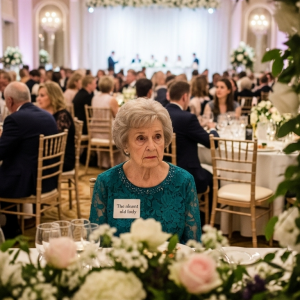The message from Fiona arrived on a Wednesday afternoon, three days before Mother’s Day. I was in my kitchen, arranging a bouquet of peonies I’d just picked from the garden, their soft petals a welcome comfort. My phone chimed, and seeing her name flash on the screen, I felt that familiar knot tighten in my stomach.
It was the same knot that appeared every time my daughter-in-law contacted me, a quiet dread that had grown steadily over the past five years.
“Barbara, Thomas and I have decided to keep Mother’s Day intimate this year. Just immediate family. Hope you understand.”
I read the text three times, my fingers trembling slightly. Immediate family. The words were like shards of glass, cutting through the fragile hope I’d held onto. After five years of marriage to my only son, Fiona still didn’t consider me family.
I set the phone down and gripped the cool marble of the countertop, forcing myself to breathe. For three years, I’d been helping them with their mortgage payments. A check for six hundred dollars, sent on the first of every month, a significant stretch on my retirement savings. It was money I gave gladly, a gift to help them build the foundation I’d always wanted for Thomas.
My phone rang. It was him.
“Mom,” he started, his voice strained in that specific way it always was when Fiona was nearby. “Did you get Fiona’s message?”
“Yes,” I managed, keeping my voice surprisingly even. “I was just wondering what ‘immediate family’ means, if not your mother.”
There was a pause. I could hear the faint sound of his hand covering the phone, his muffled murmurs to someone else. Fiona, no doubt, coaching him from the sidelines. When he returned, his voice was firmer, rehearsed.
“Fiona’s parents are coming over,” he said. “We just thought it would be nice to have the four of us this year.”
The betrayal stung, sharper than I’d anticipated. “I see. And I’m not considered family, but her parents are.”
“Mom, please. Don’t make this difficult,” Thomas sighed, the sound heavy with impatience. “Fiona thinks… we think it would be better this way. Things between you two have been tense lately.”
Tense. What a polite, empty word for the way Fiona’s eyes would glaze over whenever I spoke. How she’d “accidentally” leave me off family email chains, or the way her compliments about my home always felt like veiled insults.
“Will you still need the mortgage check this month?” The question slipped out, cold and sharp, before I could stop it.
“Of course,” Thomas responded instantly, a little too quickly. “Why wouldn’t we?”
I closed my eyes, feeling something vital inside me crack. “Just checking. I’ll mail it tomorrow.”
After we hung up, I sat at my kitchen table, staring at the check I had already written and placed in an envelope. Three years of checks. Three years of Sunday dinner invitations that were rarely accepted. Three years of birthday gifts acknowledged with a brief, obligatory text. Three years of watching Fiona methodically and quietly erase me from my son’s life.
That evening, another text from Fiona lit up my screen. “Just so there are no hard feelings, we’re having a proper Mother’s Day with my mom. I hope you’re not too upset. It’s just that Thomas and I feel more comfortable this way. You can be a bit… overwhelming.”
Overwhelming. The word echoed in the silence of my kitchen as hot tears finally burned my eyes. Was it overwhelming to love your child? To want to be a part of their life?
I picked up the mortgage check again, running my thumb along its perforated edge. Then, with a clarity I hadn’t felt in years, I tore it in half. Then into quarters, then into tiny, satisfying pieces.
My hands shook, but not from sadness. It was resolve. If I wasn’t family enough for a seat at their table, then perhaps I wasn’t family enough to pay their mortgage.
The next morning, I called the bank and canceled the automatic payment schedule. The customer service representative on the other end of the line asked if there was a problem with the account.
“No,” I said, my voice steadier than it had been in months. “I’ve just realized it’s time for some changes.”
When I hung up, a strange mix of guilt and liberation washed over me. The weight of constantly trying to earn Fiona’s approval, of pretending her subtle cruelties didn’t wound me, suddenly lifted. For the first time in a very long time, I had chosen myself.
I knew there would be a storm. Thomas would be furious. Fiona would twist this into another reason to paint me as the villain, the difficult mother-in-law she’d always claimed I was. But as I looked at the empty space on my desk where the check had been, I knew I could no longer finance my own exclusion.
Three days later, on Mother’s Day, I turned off my phone. I spent the day in my garden, sinking my hands into the rich soil and planting new life. With each seed I tucked into the earth, I made a promise to myself. No more shrinking. No more apologizing for my own existence.
By sundown, I felt a sense of peace I hadn’t realized I was missing. But I also knew that this peaceful act of self-respect was about to unleash a hurricane that would change our family forever.
The first call came at 7:42 AM on Monday. I was on the porch, enjoying my morning coffee when Thomas’s name flashed across the screen. I let it ring. Ten minutes later, he called again. By the third call, I knew the confrontation was inevitable.
“Hello, Thomas,” I answered, my voice a calm island in the storm I knew was coming.
“Mom, what the hell is going on?” His voice was tight, the anger barely contained. “The bank just called. They said the mortgage payment bounced. Did you cancel the check?”
I took a slow, deliberate sip of my coffee before responding. “Yes, I did.”
“What? Why would you—?” He stopped abruptly. I heard the muffled sound of Fiona’s voice in the background, sharp and insistent. When he came back on the line, his tone had hardened. “Is this because of Mother’s Day? Are you really going to be that petty?”
The accusation stung, but I held my ground. “This isn’t about pettiness, Thomas. It’s about respect. For three years, I have given you over twenty thousand dollars while your wife has systematically pushed me out of your life.”
“That’s not fair,” he shot back. “Fiona hasn’t—”
“Thomas,” I interrupted, my own firmness surprising me. “Your wife told me I was ‘overwhelming’ and not welcome at a family celebration. If I’m not family enough for Mother’s Day, then I’m not family enough to pay your mortgage.”
Silence stretched between us, thick with unspoken words. “This is really disappointing, Mom,” he said finally, his voice low. “I never thought you’d use money to manipulate us.”
His words were a physical blow. “Manipulate? Is that what you think I’ve been doing all these years? Supporting you?”
“Fiona thinks—”
“I don’t care what Fiona thinks anymore,” I said, the words tumbling out, raw and honest. “I care what you think, Thomas. What do you think about excluding your own mother?”
Another pause. “I think you’re overreacting. It was just one day.”
“It’s never just one day,” I said, my voice cracking slightly. “It’s a pattern. And I’m done.”
I ended the call before he could reply, my hands trembling as I set down the phone. The peaceful morning was shattered, but I didn’t regret it. By noon, the text messages began, a digital assault.
From Fiona: “Real mature, Barbara. Using money as a weapon just proves why we needed space from you.”
From Fiona, minutes later: “Thomas is devastated by your behavior. Is this really the kind of mother you want to be?”
From Thomas: “Mom, please call me back. We need to fix this.”
I ignored them all. Around 3:00 PM, my doorbell rang. I peered through the peephole to see both of them on my porch, their faces like thunderclouds. Taking a deep breath, I opened the door.
“We need to talk,” Thomas said, brushing past me without an invitation. Fiona followed, her eyes sweeping over my living room with a thinly veiled disdain that made my skin crawl.
“Yes, we do,” I agreed, closing the door and turning to face them. I folded my arms, a silent act of defiance.
“We don’t want tea,” Fiona snapped before I could even offer. “We want an explanation. And we want you to call the bank and fix this mess you’ve created.”
I looked at my son, searching his face for a flicker of the boy I’d raised—the one who brought me dandelions and promised we’d always take care of each other after his father died. All I saw was a man who couldn’t meet my eyes, a stranger standing in my living room.
“I’ve already given my explanation,” I said calmly. “I will not continue to financially support people who don’t respect me.”
“This isn’t about respect!” Fiona’s voice rose. “This is about you trying to control us. You can’t stand that Thomas has me now, so you’re trying to control him with your money!”
“That’s not true,” I said, keeping my voice level despite the fire in my veins. “I have only ever wanted to be treated with basic courtesy.”
“You call barging into our lives and criticizing everything I do ‘basic courtesy’?” she shot back.
I blinked, genuinely confused. “When have I ever criticized you, Fiona?”
“You do it all the time,” she insisted. “The way you look at our house, the comments about my cooking, your constant questions about our finances.”
“I’ve never said a negative word about your cooking,” I protested.
“You don’t have to!” she cried, turning to Thomas for support. “It’s your expression! The way you pick at your food!”
I turned to my son, my heart pleading with him to see the absurdity of it. “Thomas, you know that isn’t true.”
He shifted uncomfortably, his gaze fixed on a spot on the floor. “Mom, you… you can be critical sometimes. Maybe not directly, but…” His words trailed off.
A chill settled deep in my bones. This was her work. She had twisted my love, reframed my concern, and distorted my actions until even my own son saw me as the villain.
“I think you should both leave,” I said, my voice quiet but firm.
“Not until you reinstate the payment,” Fiona demanded, her chin jutting out.
I looked at her, really looked at her, and suddenly saw the entire calculated machine of her manipulation. The way she positioned herself between us, the subtle poisoning of my son’s mind.
“No,” I said. The word was small, but it carried the weight of years of silent pain. “The answer is no.”
“You’ll regret this,” Fiona hissed, grabbing her purse. “Come on, Thomas. She’s made her choice.”
Thomas hesitated, looking torn. “Mom, please…”
“We can work this out,” I agreed. “But not like this. Not with threats and false accusations.”
“Fine,” he said, his shoulders slumping in defeat. “Have it your way.”
As they left, slamming the door behind them, I didn’t cry. A strange, calm certainty settled over me. The worst had happened. My son had chosen his wife over me. And I had survived.
What I didn’t know then was that the real battle was just beginning. That evening, my phone buzzed. My sister had tagged me in a Facebook post. With trembling fingers, I opened the app to find a long, public message from Fiona, detailing how I, his cruel and manipulative mother, had abandoned my son and was using money to destroy their marriage.
The family war had just gone public.
By the end of the week, my life had become a storm of notifications. Missed calls, accusatory text messages, and a flood of comments on social media. Fiona’s post had spread like wildfire, with relatives and family friends taking sides without ever hearing my story.
My sister, Janet, was the only one who called to ask. “This doesn’t sound like you, Barb,” she’d said. “What really happened?”
After I explained, she sighed. “I always thought there was something off about her. Too polished. Manipulators like Fiona are experts at isolation. It’s textbook.”
Her words echoed in my mind. Textbook manipulation. Was that what this was? I pulled old boxes from the attic, spreading photos, cards, and printed emails across the living room floor. I was creating a timeline, searching for a truth I’d refused to see.
The change was subtle, but it was there. In the first year, Thomas called several times a week. After the engagement, the calls dwindled. After the marriage, and after they asked for help with the mortgage, our relationship became a series of last-minute cancellations and polite, distant texts.
I found a stack of my financial records. The mortgage payments were just the beginning. I had helped with their car insurance, paid for home repairs, and even covered their property taxes last year. All while Fiona’s social media showcased a life of weekend trips, new furniture, and designer clothes. A pattern emerged that made me feel sick.
My phone rang, startling me. An unknown number. Against my better judgment, I answered.
“Barbara? It’s Clare. Fiona’s sister.”
I stiffened. I had only met Clare a handful of times. She always seemed quiet, uncomfortable, staying on the periphery. “Clare? How did you get my number?”
“From an old contact list. Look, I saw Fiona’s post, and I… I couldn’t stay silent anymore.” There was a tremor in her voice. “She’s done this before, Barbara. With our stepfather. She turned our mother against him, convinced her he was controlling and negative. It tore our family apart.”
I sank onto the couch, my heart pounding. “Why are you telling me this?”
“Because I’ve seen how she works. She isolates people, twists their words, and uses them financially until they aren’t useful anymore,” Clare said in a rush. “She did the same thing with our stepdad. Asked for money constantly, then told our mom he was trying to control her with it.”
Her words aligned perfectly with the evidence scattered on my floor.
“There’s more,” Clare continued, her voice dropping to a whisper. “Thomas told me a few months ago that Fiona was planning a surprise anniversary party for you two. Then, suddenly, it was canceled. Fiona told everyone you’d declined the invitation because you were too busy.”
My throat tightened. “I never received an invitation.”
“I know,” Clare confirmed. “Because there never was one. She made the entire thing up to prove to Thomas that you weren’t interested in them.”
Tears burned my eyes as the pieces fell into place. The forgotten invitations, the misunderstood conversations, the times Thomas seemed hurt by something I supposedly said or did. It was all a lie. A carefully constructed narrative of her design.
After we hung up, I sat among the scattered evidence of years of manipulation, my mind reeling. My phone buzzed with a text from Thomas.
“Mom, we need to talk. Just you and me. Please.”
Was this another trap, orchestrated by Fiona? Or was he finally ready to see the truth? Either way, I knew I had to face him. This was my son.
“Tomorrow,” I typed back. “My house. 2:00 PM.”
As I sent the message, I began carefully organizing the photos, the bank statements, and the messages. Tomorrow, Thomas would finally hear the whole truth, whether he was ready for it or not.
At 2:03 PM, Thomas’s car pulled into my driveway. I watched from the window as he sat there for a long moment, his forehead resting against the steering wheel as if gathering the strength to face me.
I opened the door before he could knock. He paused on the threshold, his eyes widening as he saw the living room. I had arranged everything on the coffee table and floor: the photos, the financial records, the printed text messages, all laid out in chronological order.
“What is all this?” he asked, his voice a whisper.
“The truth,” I replied gently. “Please, sit down.”
He looked lost, a stranger in the home where he’d grown up. I noticed the dark circles under his eyes. He wasn’t sleeping. “Mom, I need to understand why you did it. We’re struggling. The bank is threatening us.”
“Are you really struggling, Thomas?” I asked, handing him a folder of Fiona’s recent social media posts. “Because this shows a weekend trip to Napa, new living room furniture, and several new designer handbags.”
He flipped through the pages, his brow furrowing. “Those were… special occasions. The trip was for work…”
“And these?” I handed him my financial records. “Three years of payments, Thomas. Not just the mortgage. Property taxes, car insurance, home repairs. All while you were supposedly struggling.”
He ran a hand through his hair, agitated. “It’s not what you think. We were going to pay you back.”
“This isn’t about the money,” I said, my throat tight. “It’s about being treated like family, not an ATM.”
His eyes flashed with anger. “That’s not fair.”
“Isn’t it?” I asked quietly. “Thomas… I got a call from Clare yesterday.”
His head snapped up, his face a mask of shock. “Fiona’s sister? Why would she call you?”
I recounted my entire conversation with Clare, watching as his expression shifted from disbelief to confusion, and then to a dawning, horrifying realization. When I told him about the anniversary party that never existed, the color drained from his face.
“That can’t be right,” he muttered. “Fiona told me she called you. She said you had a spa day planned.”
“I haven’t been to a spa in ten years, Thomas.”
He stood abruptly, pacing the room, stopping to look at a photo, a bank statement, a printed text message. I showed him the texts from Clare, the ones where Fiona referred to me as “the cash cow” and boasted about how she’d “trained” Thomas to side with her.
“I don’t understand,” he said finally, his voice breaking. “Why would she do this?”
He sank back onto the couch, burying his face in his hands. “I’ve been such a fool.” My heart ached for him. He was still my son, and his pain was my own.
I sat beside him, placing a hand on his shoulder. “You’re not a fool. You loved her. You trusted her. That’s what good people do.”
He looked up, his eyes red-rimmed. “But I believed her over you. How can you ever forgive me?”
“There’s nothing to forgive.”
We sat in silence, the weight of years of deceit hanging between us. “What happens now?” he asked, his voice steadier.
“That depends on you,” I said carefully. “I can’t tell you what to do about your marriage. But my boundaries are set. I will not be financing your lifestyle anymore. Not because I don’t love you, but because it’s not healthy for us.”
He nodded slowly. “I understand. And I wouldn’t ask you to.” He paused, swallowing hard. “I need to talk to her. I have to confront her.”
Just then, his phone buzzed. He glanced at it, his expression hardening. “It’s Fiona. She’s tracking my location. She wants to know why I’m here.”
“What will you tell her?”
Thomas stood, a new resolve in his posture. “The truth. That I’m with my mother. That I’ve seen the evidence of her lies. And that things are going to change.”
His phone began ringing insistently. “She’s calling now,” he said, showing me the screen. He stepped out onto the porch to take the call. Through the window, I saw his back straighten, his gestures becoming sharp and emphatic.
When he came back inside, his face was pale but determined. “She’s coming over,” he said. “She says it’s all a misunderstanding. That she can explain everything.”
“Do you want me to be here?” I asked.
He took a deep breath and nodded. “Yes. It’s time we all faced the truth together.
The sound of squealing tires announced Fiona’s arrival. She burst through the door without knocking, her eyes wild. She froze when she saw the evidence spread across the room, her gaze darting between Thomas and me.
“What is this?” she demanded, her voice shrill. “What lies have you been telling him?”
“The truth, Fiona,” Thomas said, his voice rigid.
“The truth?” She let out a sharp, humorless laugh. “You mean her warped version of it? Thomas, you know how she twists things!” She was already deploying her classic tactics: deflection, projection, gaslighting.
“I spoke to your sister, Fiona,” Thomas said quietly.
Fiona’s mask of composure flickered. “Clare? That backstabbing—” She stopped, forcing tears to her eyes. “Clare has always been jealous of me. Everything she said is a lie.”
“Is this a lie?” Thomas held up the printout of her texts about the “cash cow.”
Fiona’s face went white. Her demeanor shifted again, the tears vanishing, replaced by cold fury. “You had no right to go through my private messages!”
“And you had no right to manipulate my relationship with my mother!” Thomas shot back. “You had no right to lie, to isolate me, to use her!”
“I was trying to protect our marriage!” she shrieked. “Your mother has always hated me!”
“That is not true, Fiona,” I said, my voice calm and steady. “I welcomed you. I supported you. All I ever wanted was to be a part of your lives.”
“You’ve turned him against me!” she hissed, pointing a trembling finger at me.
“No one needed to turn me against you, Fiona,” Thomas said, his voice heavy with weariness. “You did that all by yourself.”
She stared at him, cornered. “I’m leaving,” she spat. “Are you coming?”
The question hung in the air. Thomas took a deep breath. “No, Fiona. I’m not.”
The words struck her like a physical blow. Her eyes widened in disbelief. “You’re choosing her over me?”
“I’m choosing the truth,” Thomas replied. “And our marriage was built on your lies.”
A cold, calculating look hardened her features. “Fine,” she spat. “Stay with your mommy. But you will regret this.” With that, she stormed out, slamming the door so hard a picture frame rattled on the wall.
Thomas collapsed onto the couch. “I can’t believe I didn’t see it.”
I sat beside him, placing a hand on his back. “Don’t blame yourself. You know now.”
The next few weeks were a blur of lawyers and painful decisions. Thomas filed for separation. Fiona emptied their joint bank account and threatened to sue me. She spread vicious rumors, and Thomas lost friends who chose to believe her narrative. But through it all, I saw my son growing stronger, more certain.
One month later, he received a text from Clare. “Stay strong. The truth always comes out.” Two days after that, Fiona’s ex-friend, Melissa, came forward with more evidence of her schemes, troubled by the lies she was spreading. The divorce proceedings shifted dramatically in Thomas’s favor.
One Year Later
I stood in my garden, pruning roses. The past year had been a journey of healing. A car pulled into the driveway, and Thomas emerged, a small gift bag in his hand and a genuine smile on his face.
“Happy Mother’s Day,” he said, embracing me tightly.
“You remembered?” I whispered, my throat tight with emotion.
“How could I forget?” he smiled. “I made us reservations at noon.”
We sat on the porch swing, a tradition from his childhood. “The divorce is final,” he said. “I feel… free.” He told me he’d bought a small house nearby, that he was seeing a therapist to understand the manipulation he’d endured.
“He said,” Thomas explained carefully, “that I was vulnerable because I always felt I needed to be perfect for you, to make up for all your sacrifices. Fiona exploited that.” His honesty was a balm. We talked openly, without the old fears and assumptions.
He handed me the gift. I unwrapped it to find a framed photo of us at his college graduation, both of us beaming. The last photo taken before he met Fiona. The last uncomplicated moment.
“I found it when I was packing,” he said.
Tears welled in my eyes. “It’s perfect.”
Later, at the restaurant, Thomas raised his glass. “To new beginnings,” he said. “And to the strongest woman I know.”
I smiled, clinking my glass against his. “To truth,” I added. “And to knowing our own worth.”
The painful exclusion from last year’s Mother’s Day had set in motion a chain of events that, while devastating at the time, had led us here. To a place of healing, honesty, and a rebuilt love. The check I had torn up was not an act of revenge, but an act of self-respect that had saved us both.




